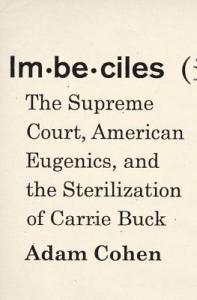 by Adam Cohen
by Adam Cohen
ISBN 978-0-14-310999-0
“Whitehead’s representation of Carrie at the trial and on appeal was an extraordinary case of malfeasance. Not only did he violate well-established ethical rules about the duty of loyalty to a client…but his entire representation of Carrie, in a case of enormous importance to her, was a fraud.”
In 1907, Indiana passed the first law authorizing a state to engage in eugenic sterilization, which permitted medical operations that cut off the reproductive abilities of those who were deemed “unfit” to procreate for a variety of reasons. However, it would take twenty years for the constitutionality of such laws to be sanctioned by the Supreme Court, and that case would come from Virginia, a relatively late adopter of eugenic sterilization. At the centre of that case was Carrie Buck, a girl of nineteen who had already borne one illegitimate child, and who was the daughter of a woman who had also been deemed “feebleminded.” In a nearly unanimous decision that has never been overturned, the Supreme Court ruled on Buck v. Bell in 1927, upholding eugenics laws broadly, and Carrie’s sterilization specifically. In Imbeciles, Adam Cohen investigates this miscarriage of justice, chronicling the rise of the eugenics movement in America, and how Carrie Buck was actively misrepresented for the sake of this cause.
It is difficult to understate the tragedy of Carrie’s situation. The family that took her in when her mother was unable to care for her did not adopt her, so much as they used her for free labour. When their nephew raped her, they dealt with the situation by having Carrie committed to the Virginia Colony for Epileptics and the Feebleminded, where the main evidence of her supposed feeblemindedness was the promiscuity evidenced only by her pregnancy. Because her mother was already a resident of the colony, the doctors who were supposed to be caring for her singled Carrie out to be the guinea-pig of their schemes for improving the “American stock.” Every guardian, advocate, and caretaker who should have protected her not only failed in their duty, but actively colluded in her victimization. Two in particular stand out: Irving Whitehead, the lawyer who was supposed to be representing her, but who instead cooperated with the opposition, and Aubrey Strode, the lawyer for the colony, who the evidence suggests was not a believer in eugenics, and yet bent himself tirelessly to the task of seeing it upheld by the nation’s highest court.
As a history, Imbeciles deals primarily with the men who shaped Carrie’s fate, rather than with the woman herself. No doubt these prestigious and well-educated men left a larger record than a woman who had to leave school after the fifth grade, and who did not speak publicly about her situation until the 1980s. Cohen profiles the four men who played the largest roles in forming and deciding Carrie’s case: Dr. Albert Priddy, Harry Laughlin, Aubrey Strode, and Justice Oliver Wendell Holmes Jr. Priddy was the head of the Virginia colony where Carrie was committed, and he was avid advocate of eugenic sterilization, as well as the person who chose Carrie to be at the centre of a test case that would confirm the constitutionality of eugenic sterilization. Aubrey Strode, the colony’s lawyer, both drafted the Virginia eugenics law, and defended the case all the way to the Supreme Court, where the majority opinion in favour of Carrie’s sterilization was penned by Holmes. Though he never met Carrie, Harry Laughlin, head of the Eugenics Record Office, and a eugenics evangelist, was an expert witness in the case. Together, they sealed her fate. Each man merits two chapters, a structure that bogs down the narrative and creates repetition as Cohen retreads portions of the timeline with each new figure.
Cohen touches only a little on the decided misogyny that pervaded eugenics legislation. Women could be deemed feebleminded simply for being too sexual, as was a significant factor in Carrie’s case. In covering up the rape committed by their nephew, the Dobbs family cast Carrie as an immoral woman unable to control her own base urges. All evidence not created by those with a personal stake in the matter suggests that Carrie was of normal intelligence, if undereducated. She performed perfectly well in school, completing the fifth grade before the Dobbs family pulled her out so that she could do more work. She communicated with the colony via letter during her parole, and after her discharge. When she was placed in a home during her parole, the family assumed she must be an epileptic, because she seemed to be of perfectly normal intelligence. Although men were also sterilized, 67% of the operations performed in the wake of Buck v. Bell were conducted on women, who often did not understand the purpose of the procedure they were being subjected to. And since Carrie Buck was white, Cohen touches even less on the implications of such laws for African Americans and other non-white citizens.
Imbeciles in is a revealing history of American sterilization, with a somewhat repetitive focus on the legal process of the case, and its shortcomings. Cohen points out the continued relevance of this subject as genetic science continues to advance, and also highlights the ways in which such sentiments tend to get tied up in anti-immigration rhetoric. Words that we use lightly today—idiot, imbecile, moron—carry a weight of historical baggage that many people are unaware of, and Imbeciles shines a light on that history.
___
You might also like Speak Now by Kenji Yoshino
Advertisements Share this:- History
- Non-Fiction





